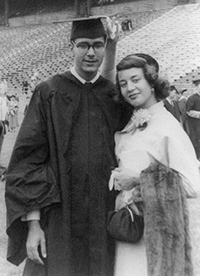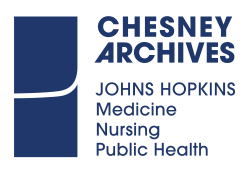Joseph Henry French was an African American pediatric neurologist. French was born in 1928 to Bertha Mae Dickerson and Joseph Blaine French in Toledo, Ohio. French attended Ohio State University, where he earned a B.A. in 1950. French married Marilyn Doss French that same year and the couple went on to have four children: Lenore Karen, Joseph Mark, Lisa Kendall, and John Magnus. Joseph French received his M.D. from Ohio State University College of Medicine in 1954. French completed a pediatric residency in Philadelphia at St. Christopher’s Hospital for Children. He then continued his postgraduate training in Baltimore, where he served as a fellow in neurologic medicine at Johns Hopkins Hospital and the Johns Hopkins University School of Medicine from 1958 to 1961; a research fellow in neurologic medicine and biologic chemistry from 1961 to 1962; and assistant resident in neurology at Baltimore City Hospitals from 1960 to 1961. At Johns Hopkins, French trained with David Clark, who helped to develop pediatric neurology as a specialty at Hopkins.
From 1964 to 1979, French served as a professor of neurology and pediatrics, a director of the Pediatric Neurology Fellowship Training Program, and Assistant Dean for Student Education at Albert Einstein College of Medicine in New York. He held an appointment as a professor of clinical neurology and pediatrics at the State University of New York (SUNY) from 1980 to the early 1990s. French also served as the Deputy Director for Clinical Services at the New York State Institute for Basic Research in Developmental Disabilities from 1980 to 1986. From 1990 to 1996, French was a professor of pediatrics at Meharry Medical College, a Historically Black College and University (HBCU) in Nashville, Tennessee. While there, French also served as director of the department of pediatrics and of the Pediatric Training Program at Interfaith Medical Center, where he received commendation for his work as a teacher and mentor.
As a researcher and clinician, French was particularly interested in disorders of lead and copper metabolism. Much of his work focused on understanding the genetics of neurological and developmental disorders which led to conditions such as epilepsy, migraine, and intellectual disabilities. In addition to synthesizing research in the field for edited volumes on neurology and pediatrics, French published and presented on topics such as intellectual disabilities, seizure disorders, Menkes syndrome (“kinky hair disease”), Fragile X syndrome, and Lowe syndrome. Some of French’s publications and presentations engaged with topics that were particularly relevant for African American and/or urban populations, such as sickle cell disease, lead neurotoxicity, and neurological disorders and perinatal mortality in urban and inner-city centers.
French published dozens of articles over the course of his career and was co-editor of the International Review of Child Neurology from 1972 to 1990. He was a founding member of the Child Neurology Society and a longtime member of the National Institutes of Health (NIH) Consensus Development Program, serving on the NIH Consensus Development Conference for the Treatment of Destructive Behaviors in Persons with Developmental Disabilities.
In partnership with his wife, Marilyn Doss French, Joseph H. French was also a supporter of civil rights and active in anti-racist community building. He marched to Selma with Dr. Martin Luther King, Jr. to help treat the ill and injured. In the different communities where they built their professional lives, Joseph and Marilyn French were active in the Unitarian Church; supported anti-racist adult and family education; helped to found and sustain a racially integrated children’s camp; and worked with different organizations devoted to social justice and change, including the United Negro College Fund. Joseph French died in 1999.
Marilyn Elizabeth Doss French
Marilyn Elizabeth Doss French was an African American editor, patron of the arts, and social activist. Doss was born in 1929 to Velma L. Kendall Doss and Raymond Milton Doss in Cleveland, Ohio. Doss attended Case Western Reserve University in Cleveland, meeting future husband Joseph Henry French in her junior year. The couple was married in 1950 and together had four children: Lenore Karen, Joseph Mark, Lisa Kendall, and John Magnus. Following the family’s move to Westport, Connecticut in 1965, Marilyn Doss French attended Sarah Lawrence College, where she studied literature, writing, and visual arts. Doss French graduated with a B.A. in 1970. Doss French went on to complete an M.A. in Arts Administration at New York University in 1985 and was a Ph.D. Candidate in the program at the time of her death in 1987. Throughout her life, Marilyn Doss French was a supporter and patron of education and the arts and was actively engaged in civil rights and community building.
Marilyn Doss French spent much of her career pursuing interests in publishing, history, and art and museums. During Joseph French’s medical education and training in the late 1950s and early 1960s, Marilyn Doss French worked at multiple institutions as a medical secretary and began work as a freelance medical editor for several physicians and scientists. Doss French worked as an editor and production manager for Greenwood Press from 1970 to 1977. At Greenwood, she often worked on titles concerned with social history, Black Studies, and Black history. Doss French was an editor and proofreader for corporate graphics for the Continental Corporation from 1982 to 1984, before pursuing her interest in art and museum administration full-time at NYU. A patron and supporter of the arts throughout her life, Doss French was active with several art organizations. She served on the Board of the Staten Island Council of the Arts and the Art Lab at the Snug Harbor Cultural Center. Doss French was particularly interested in programs to bring diverse art to children; she wrote a proposal for the Staten Island Children’s Museum as part of her graduate work in Arts Administration at NYU.
Marilyn Doss French was deeply engaged in social activism and anti-racist community building efforts. Along with her husband, Joseph Henry French, Marilyn Doss French built networks for social change in the communities where they settled, including Denver, Colorado and Westport, Connecticut. During her time in Colorado, Doss French was active with organizations like the Colorado Urban League and the State of Colorado Anti-Discrimination Commission, which solicited her help conducting an early investigation of redlining and racist housing discrimination in the area. In Westport, Connecticut, Doss French served as an officer for several organizations, including the World Affairs Center (1965-1974), the Westport Public Library (1970-1977), and the League of Women Voters. Doss French was also a founding member and one-time president of the Inter-Community Camp of Westport, Norwalk, and Bridgeport, a racially integrated summer camp created in the wake of Dr. Martin Luther King, Jr.’s assassination. The camp, which the French family helped sustain for over a decade, was intended to bridge the racial and socioeconomic divide among children in Fairfield County. Many of the causes which Marilyn Doss French supported were tied to children and education, including adult and children’s continuing education through the Unitarian Church, the Colorado Urban League’s Family Motivation Project, and her ongoing interest in bringing art to children. Marilyn Doss French died in 1987. Following her death, Joseph French established the Marilyn French Memorial Fund for minority art education; a special showing was held at the Center for African Art (now the Museum of African Art) in New York in her honor.
< Read Less
The Joseph Henry French and Marilyn Doss French collection documents the personal and professional lives of both individuals. The Personal and family papers series consists primarily of biographical material, educational records, correspondence, and material that documents their cultural interests and their mutual civil rights and community activism. Marilyn Doss French’s Professional series documents her training and work in editing, publishing, the arts, and museum administration. The series includes jacket covers and promotional material for books she worked on at Greenwood Press, material related to her Ph.D. program in Museum Administration at New York University, and evidence of her contributions to other art organizations. Joseph Henry French’s Professional series spans his entire career and his appointments at several universities and hospitals from the 1960s to the 1990s. The series also documents his professional affiliations and service, publishing, and presentations.
It is worth noting that Joseph French (and his family) lived in Baltimore and trained at Johns Hopkins Hospital and the Johns Hopkins University School of Medicine for only a few years, as French completed his postgraduate work at Hopkins between 1958 and 1962. Thus the collection contains very little material related to Johns Hopkins or Baltimore. A few items in the Personal and family papers series suggest the family’s connection to the Baltimore community, including children’s school records and a birth announcement in the Afro-American newspaper, membership materials for the First Unitarian Church of Baltimore City, correspondence, and personal and household expenses from that time period.
The collection’s particular strengths are in tracing the personal and professional commitments of an African American family whose work and lives spanned the civil rights movement and its aftermath. Of particular note is the sub-series on Civil rights and community engagement, which documents Joseph French and Marilyn Doss French’s sustained work for social justice and civil rights. Partly organized according to two of the communities where the Frenches lived and worked – Denver, Colorado and Westport, Connecticut – these materials show the many ways the French family embedded themselves in the social and civic fabric of their chosen communities and contributed to the ongoing fight for social justice and change. As a whole, the collection speaks to the indivisibility of their efforts for professional and social advancement and racial uplift, a reality that was undoubtedly true for other African American medical professionals during this era.

